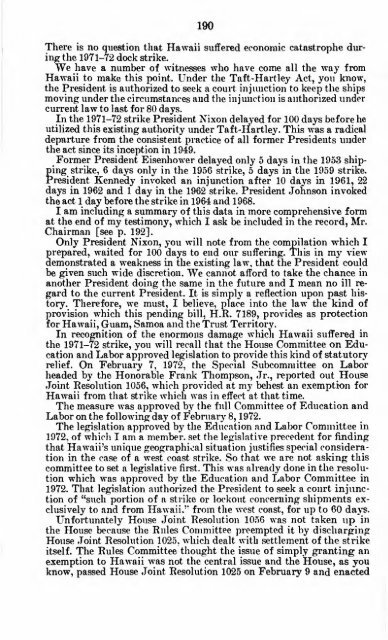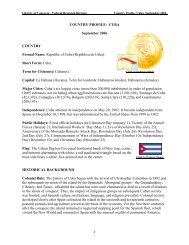1 - American Memory
1 - American Memory
1 - American Memory
You also want an ePaper? Increase the reach of your titles
YUMPU automatically turns print PDFs into web optimized ePapers that Google loves.
MO<br />
There is no question tliat Hawaii suflFered economic catastrophe dur-<br />
ingc the 1971-72 dock strike.<br />
We have a number of witnesses who have come all the way from<br />
Hawaii to make this point. Under the Taft-Hartlej' Act, you know,<br />
the President is authorized to seek a court injunction to keep the ships<br />
moving under the circumstances and the injunction is authorized under<br />
current law to last for 80 days.<br />
In the 1971-72 strike President Nixon delayed for 100 days before he<br />
utilized this existing authority under Taft-Hartley. This was a radical<br />
departure from the consistent practice of all former Presidents under<br />
the act since its inception in 1949.<br />
Former President Eisenhower delayed only 5 days in the 1953 ship-<br />
ping strike, 6 days only in the 1956 strike, 5 days in the 1959 strike.<br />
President Kennedy invoked an injunction after 10 days in 1961, 22<br />
days in 1962 and 1 day in the 1962 strike. President Johnson invoked<br />
the act 1 day before the strike in 1964 and 1968.<br />
I am including a summary of this data in more comprehensive form<br />
at the end of my testimony, which I ask be included in the record, Mr.<br />
Chairman [see p. 192].<br />
Only President Nixon, you will note from the compilation which I<br />
prepared, waited for 100 days to end our suffering. This in mj' view<br />
demonstrated a weakness in the existing law. that the President could<br />
be given such wide discretion. We cannot afford to take the chance in<br />
another President doing the same in the future and I mean no ill re-<br />
gard to the current President. It is simply a reflection upon past his-<br />
tory. Therefore, we must, I believe, place into the law the kind of<br />
provision which this pending bill, H.R. 7189, provides as protection<br />
for Hawaii, Guam, Samoa and the Trust Territory.<br />
In recognition of the enormous damage which Hawaii suffered in<br />
the 1971-72 strike, you will recall that the House Committee on Edu-<br />
cation and Labor approved legislation to provide this kind of statutory<br />
relief. On February 7. 1972. the Special Subcommittee on Labor<br />
headed by the Honorable Frank Thompson, Jr., reported out House<br />
Joint Resolution 1056, which provided at my behest an exemption for<br />
Hawaii from that strike which was in effect at that time.<br />
The measure was approved by the full Committee of Education and<br />
Labor on the following day of February 8,1972.<br />
The legislation approved by the Education and Labor Committee in<br />
1972, of which I am a member, set the legislative precedent for finding<br />
that Hawaii's unique geographical situation justifies special considera-<br />
tion in the case of a west coast strike. So that we are not asking this<br />
committee to set a legislative first. This was already done in the resolu-<br />
tion which was approved by the Education and Labor Committee in<br />
1972. That legislation authorized the President to seek a court injunc-<br />
tion of "such portion of a strike or lockout concerning shipments ex-<br />
clusively to and from Hawaii." from the west coast, for up to 60 days.<br />
LTnfortunately House Joint Resolution 1056 was not taken up in<br />
the House because the Rules Committee preempted it by discharging<br />
House Joint Resolution 1025, which dealt with settlement of the strike<br />
itself. The Rules Committee thought the issue of simply granting an<br />
exemption to Hawaii was not the central issue and the House, as you<br />
know, passed House Joint Resolution 1025 on February 9 and enacted



![Albert Einstein Papers [finding aid]. Library of Congress. [PDF ...](https://img.yumpu.com/21604228/1/190x245/albert-einstein-papers-finding-aid-library-of-congress-pdf-.jpg?quality=85)





![American Colony in Jerusalem Collection [finding aid]. Library of ...](https://img.yumpu.com/17941275/1/190x245/american-colony-in-jerusalem-collection-finding-aid-library-of-.jpg?quality=85)



![Piccard Family Papers [finding aid]. - American Memory - Library of ...](https://img.yumpu.com/17941234/1/190x245/piccard-family-papers-finding-aid-american-memory-library-of-.jpg?quality=85)


